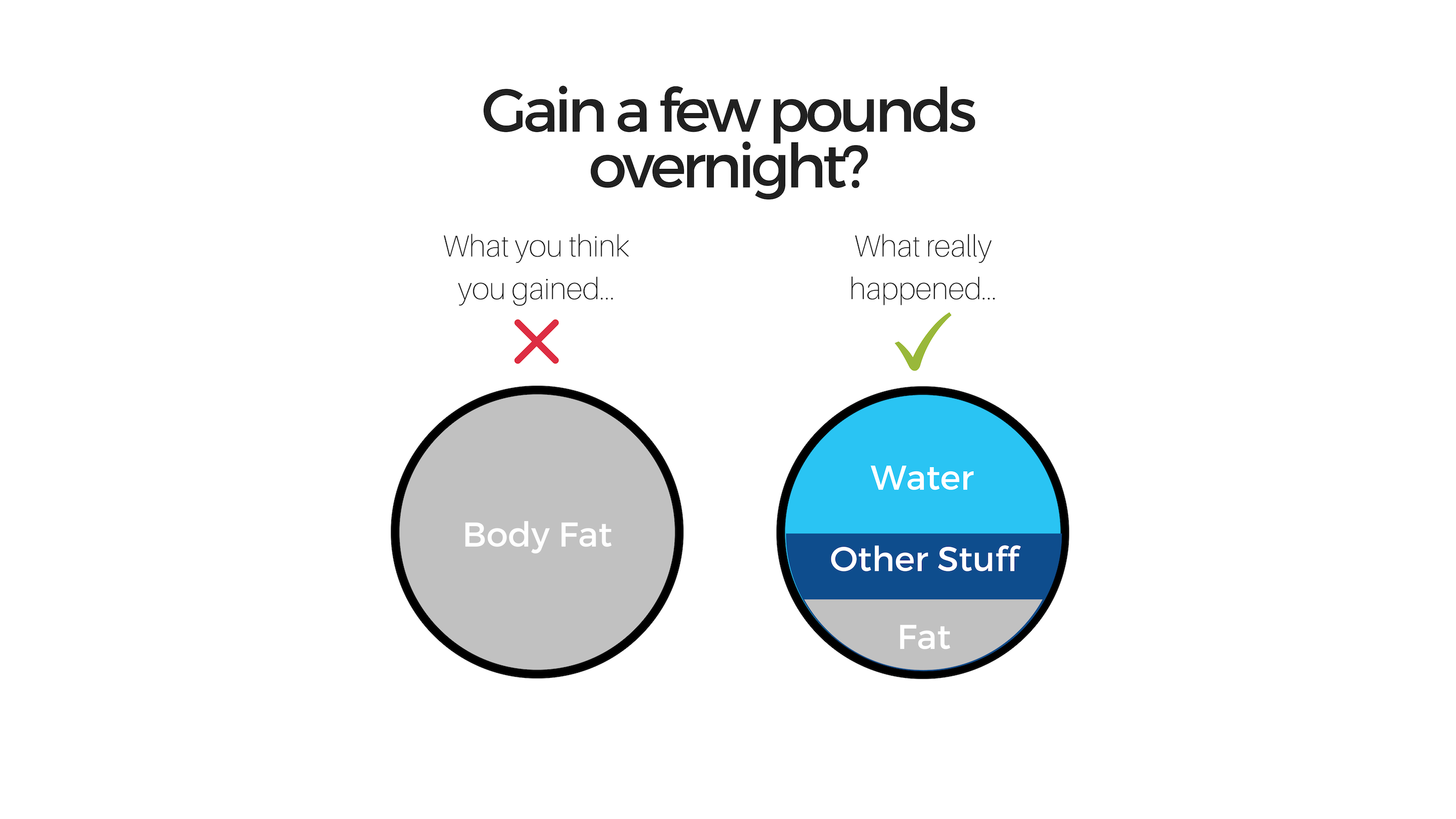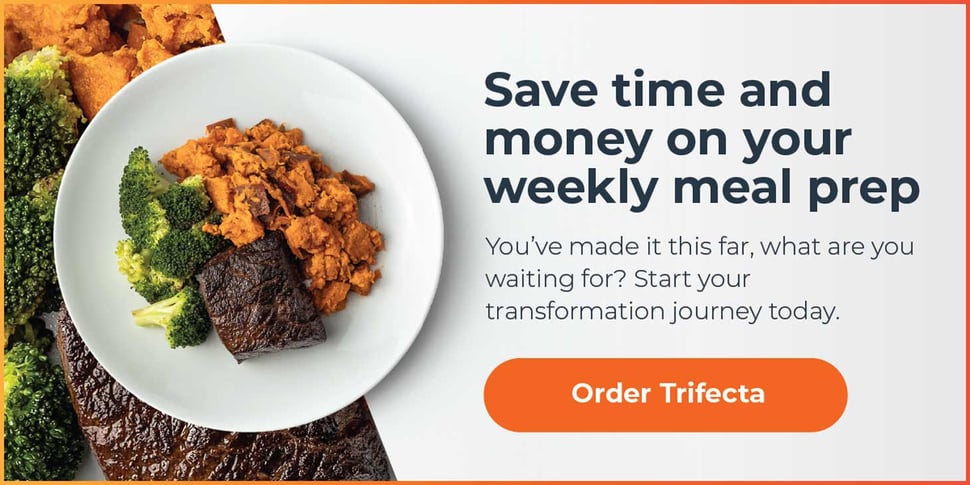We’ve all been there. Whether it’s one cocktail too many that leads to a midnight pizza binge, or perhaps you just wanted a taste of something sweet and ended up eating a family-size bag of candy. Or maybe you're just coming out of the holiday season feeling utterly defeated. It happens. But how much damage have you really done? And will you survive the guilt and the food baby?
Here's a complete scientific breakdown of how much fat you could potentially gain from a day of binging or overeating, and what to do about it.
Want to make sure you stay on track with your goals? Grab this free Meal Prep Toolkit for Weight Loss. Complete with custom calorie and macro goals, menu planning tools, and expert advice!
When a Cheat Meal Gets Out of Hand
The thing to remember is, no one food item can make or break your diet, just as it is pretty difficult to undo a month’s worth of hard work in a day or two. You may end up doing a little damage if you push it too far, but it’s probably not anything that will derail you completely or that can’t be fixed. Plus it’s alright to let your diet get a little off track every now and then. Heck, research suggests it might even help your progress in the long run (1).
Traditional wisdom claims it takes 3,500 calories extra to gain a pound of fat, but you won’t necessarily gain one pound of fat in a day, it usually takes multiple days of excessive intake to increase body fat storage. You will, however, likely see the numbers on the scale go up and feel more bloated due to water weight.
Water Weight vs. Fat Weight
Fat gain or muscle gain happens slowly over time, whereas water weight gain can be rapid and more drastic. When you gain fat or muscle, your body has to capture, store and utilize nutrients accordingly - it is not always a simple process and can take days or even weeks. But with water weight, your cells are able to absorb excess water under a variety of circumstances including lack of sleep, high sugar or salt intake, hormones, and even the weather (2,3)
If you've found you've gained a few pounds overnight or even in a week, it could be that a lot of this weight is coming from changes in fluids (aka water weight or bloating). So take a deep breath and don't freak out. Just as water weight can be gained quickly, you can lose it quickly to. So get back on track and give your body time to flush it out, the damage may not be as bad as you think.

Will One Cheat Day Ruin Your Diet?
While the benefits of cheat days are widely debated, most of the research on overfeeding involves small sample sizes over a week or more and only looks at sedentary individuals – currently, there is no research looking at effects from one day’s worth of overeating (4).
But, here is what we do know:
Excess Calories Lead to Weight Gain
However, the calorie equation is not a perfect science. The total amount of fat you could potentially gain in a day depends on many factors like your level of activity, metabolism, current body fat percentage, glycogen stores, the types of food you are consuming, and even your genetic makeup (4). One study showed that a higher starting weight could result in more fat accumulation than lean mass, regardless of how quickly weight is gained (5). And one study looking at overfeeding in twins suggested genetic makeup can significantly impact total body fat percentage gain (6).
Eating More, Increases Your Metabolism
But only temporarily. Ever get the meat sweats? Thanks to the thermic effect of food, your body burns calories to physically digest what you consume. And when you digest larger amounts, you use more energy and generate more “heat” – which can sometimes make you feel physically warmer. The types of foods you eat can determine how much this phenomenon occurs. Protein is the most thermogenic macro, followed by carbohydrates. Fat has little to no thermic effect (7). Unfortunately, the increase in your metabolism is short-lived and you will likely return back to your baseline by the next day.
The Type of Food You Eat Could Make a Difference
Research suggests eating more protein and “clean” foods may not cause as much weight gain, specifically body fat gain. In a study looking at the thermic effect of processed foods, participants burned twice as many calories digesting more whole foods compared to highly processed options (8).
Macros: Carbs vs. Fat
Some research implies your body can accommodate a lot more carbohydrates than fat. In one study, a 2,000 calorie diet was increased to 4,000 calories per day with 86% of calories from carbs. Even after 7 days of overfeeding, carb oxidation for energy spiked, and only 50% of the additional carb calories were stored as fat (9). Compared to a study looking at a small increase of 40g of fat overfeeding on a normal diet, where just about all additional fat intake was stored as fatty tissue (10).
But looking at a review of three studies on overfeeding comparing fats and carbs, there is not a clear difference between fat mass accumulation, and both diets lead to roughly 60-70% of total weight gain as fat on average (4). A couple of studies suggest there may be a difference between the type of fats and carbs consumed, with saturated fat and sugar promoting more fat storage than unsaturated fats and complex carbohydrates from whole foods (11).
Eat More Protein Instead
Even more interestingly, overfeeding on protein may lead to increased lean mass instead of fat and less weight gain overall. A month-long study looking at a 1,000-calorie overfeeding with 20% of calories coming from protein, compared to 10 to 14% calories from protein, resulted in roughly half the amount of fat gain with higher protein intakes (1.1 kg vs. 2.0kg) (12).
So... How Much Weight Will You Gain?
If you’re currently counting your macro intake from the cheat in your head, keep in mind your body has a limited amount of carbohydrate storage capacity – once you go over this you start storing carbs as fat.
The average person can store up to 400 grams of carbs in their muscles and 100 grams in their liver, totaling 2,000 calories of carbs (13). On the flip side, the body has an almost unlimited capacity for storing fat. Protein is stored differently, when consumed it is broken down and used for bodily functions, increasing muscle mass, used for immediate energy, or stored as fat.
Breaking it Down:
Let’s assume you are fairly glycogen (or carb) depleted from dieting and will efficiently store almost all of the carbs you consume (up to 90%). And because you are likely active and do not have a large amount of fat to lose, based on the science, roughly 60% of any weight gain would be as body fat.
Will eating 3,500 calories more than your maintenance result in 1 pound of fat gain?
If you ate and drank 3,500 calories over your daily limit, with the following macro breakdown:
- 2100 calories from carbs = 525 grams of carbs and 60% of your calories from carbs
- 500 calories from protein = 125 grams of protein and 14% of your calories from protein
- 900 calories from fat = 133 grams of fat and 25% of your calories from fat
And you did not compensate with added physical activity, the following would theoretically result...
- 90% of 500 = 450 grams of carbs are stored with water in your muscles and liver.
- 75 grams of carbs remain.
- With the additional calories from fat and protein, this equals 1,700 calories towards weight gain.
- Assuming 60% or 1,020 calories, are converted to fat, you could potentially gain 0.3 pounds of fat.
Bottom Line: While this scenario is not accounting for short term metabolism increase or increased output from higher energy levels, less than 1/3 of a pound of fat for a 3,500 calorie binge is not extremely terrible or irreversible. Nor is it guaranteed science, but just an estimate of what could happen. This calculation also doesn't include any alcohol intake!
What to Do When You Binge or Overeat
While the potential fat gain is one thing, going way overboard on your cheats can also drain your energy, dampen your mood and make you feel pretty bloated/icky. Luckily with a little time and patience, most of this will subside. But if you are looking for a few quick tips to soften the blow and get you feeling back to normal sooner, here are some easy ways to bounce back.
1. Drink Plenty of Water
Even though you are probably retaining water, it still helps to keep flushing your system. Staying hydrated will prevent you from storing any more water weight and may help balance your mood and your appetite (14,15).
2. Get Some Sleep
Clock in a little earlier each night to get some additional rest. Sleep is not only important for maintaining energy levels, a better mood, and overall recovery, it might also impact your fluid balance (16). Not to mention poor sleep is associated with weight gain in some people (17).
3. Eat Foods That Decrease Bloating
Just like water, fiber is a great way to flush the system and... ahem, get things moving again. But it is possible to get too much of a good thing and if you overdo it, especially on insoluble fiber foods, you might end up making yourself more bloated and gassy. Instead opt for foods that help combat your bloat like spinach, parsley, celery, or lemon. You can also try omega-rich fish, like salmon, or probiotics.
You can also cut out artificial sweeteners, and carbonated beverages, stop chewing gum and remember to eat and drink your food slowly to prevent sucking in any more excess air.
4. Exercise
No better way to drop some guilt and excess water than with a good sweat sesh. Not to mention, exercise can help improve your mood and energy levels. For bonus relief, add a short stint in the sauna after your workout.
5. Balance Your Electrolytes
By cutting your salt and sugar intake and increasing your intake of potassium, calcium, and magnesium. Salt and sugar cause you to store more water, whereas other electrolytes help balance you out. For potassium try fruits and veggies, for calcium try low-fat yogurt, and for magnesium try pumpkin seeds or spinach.
Get Back on Track
Take control of your diet and lose weight with a meal plan that fits your personalized macro goals and food preferences using meal prep. Get started today with this free RD-written guide, complete with calorie and macro goals, food lists, and menu planning tools designed to keep you on track.
Ready to drop the weight and the excuses?

